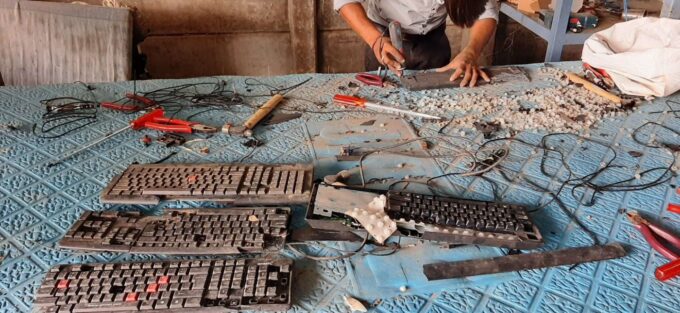Sustainable processing of e-waste thanks to coworking
An Indo-Swiss research team led by Empa researchers is developing an ecological and solidarity-based business model in which micro-entrepreneurs are to be integrated into the value chain without investment capital.

In India, over 90 percent of e-waste is processed in the informal sector. This activity provides income for many families, but often pollutes the environment and the health of workers. Adapting and complying with legal regulations is difficult due to the investment and administrative burden required.
This is where the Ecowork project comes in, which was funded by the Swiss National Science Foundation and Innosuisse through the Bridge program: A novel business model based on the coworking concept was developed to support small businesses in the informal sector. This approach was initiated by an Indian-Swiss team, including environmental scientist Dea Wehrli, who works at Empa and is co-leading the project. She specializes in recycling electronic waste and worked in this field in India before joining Ecowork.
"The Ecowork Space is intended to become a kind of incubator hub and integrate entrepreneurs into the value chain. In doing so, we can draw on Empa's valuable knowledge and many years of experience in e-waste recycling."
Tools and protective equipment
Ecowork is aimed at microentrepreneurs without investment capital or experience in running a business. It is currently being set up and tested in Delhi and is expected to provide jobs for around 40 interested people in the first year. Even while working with Ecowork, participants remain self-employed.
"We offer them a business model with several elements: They can rent a safe and legal workplace, and they get access to tools and protective equipment. We also want to support them in using more efficient work processes and in administrative steps, and offer them training opportunities," explains Wehrli. In this way, the participants should be able to increase their market and earn more income.
More efficiency thanks to apps
The Ecowork business model also includes digital solutions. The microenterprises can network with the help of apps. Dea Wehrli explains how this works: "If a worker extracts only a small amount of a certain material when dismantling a laptop, thanks to the app she can combine it with extracted material from another microenterprise nearby and offer a larger quantity for sale. Buyers are more interested in larger quantities and pay higher prices for them," explains Dea Wehrli.
The scientist is excited: "E-waste is a global challenge. Swiss research has expertise in this area. I see it as our responsibility to use this knowledge and the opportunities we have to help improve the ecological and social situation in the recycling sector. All the more so because our solution - if it proves successful - could be transferred to many other countries."
Source: Empa









